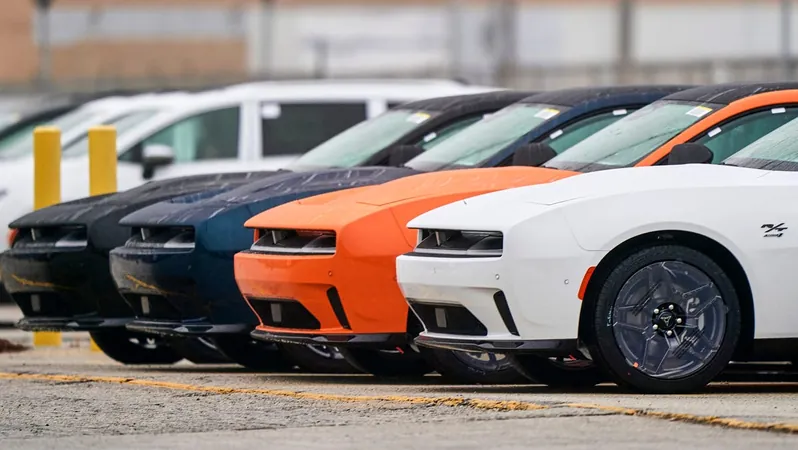
Stellantis Hits the Brakes: 900 U.S. Workers Laid Off Amid New Tariffs, Production Halt in Canada and Mexico!
2025-04-03
Author: Michael
Stellantis Announces Layoffs and Production Halts
In a dramatic turn of events, Stellantis NV has announced the temporary layoff of about 900 workers across its U.S. facilities as production pauses at various assembly plants in Canada and Mexico. This significant move comes in response to new automotive tariffs implemented by the U.S. government, which began affecting the industry just after midnight.
Internal Memo from Stellantis Leadership
An internal communication from Antonio Filosa, the North American head of Stellantis, outlined the company's strategy in response to the 25% tariffs on imported cars, proclaimed just last week by President Donald Trump. These tariffs, which extend to auto parts by May 3, have raised alarm bells for automakers across the continent.
Impact on Production Facilities
Among the plants directly affected, the Windsor Assembly Plant, known for producing the Chrysler Pacifica and the all-new electric Dodge Charger Daytona, will be idling for two weeks commencing Monday. Meanwhile, Stellantis's other Canadian facility in Brampton had been shut down for retooling prior to this announcement.
In Mexico, the Toluca Assembly Plant will cease operations for the entire month, affecting the production of popular models like the Jeep Compass and the electric Jeep Wagoneer S. However, the Saltillo plant, which manufactures Ram heavy-duty pickups, will remain operational amid this chaos.
Commitment to Employees
Filosa assured employees that the company is committed to navigating this challenging landscape, emphasizing the importance of resilience and adaptability in face of these changes. “We will protect our company, maintain our competitive edge, and continue delivering great products to our customers,” he stated.
Details of the Layoffs
The looming layoffs will impact multiple U.S. facilities, including stamping operations in Warren and Sterling Heights, as well as three in Kokomo, Indiana: Indiana Transmission Plant, Kokomo Casting Plant, and Kokomo Transmission Plant. These facilities are integral to the production lines in Canada and Mexico that are now facing significant operational pauses.
Reactions from Labor Unions
As labor unions respond, UAW President Shawn Fain expressed dismay at Stellantis’s decision. “Stellantis continues to play games with workers’ lives,” Fain noted, criticizing the automaker for what he views as a misplaced strategy that neglects the potential for increased domestic employment.
Meanwhile, Lana Payne, president of Canada’s Unifor union, echoed similar sentiments regarding the adverse effects of the tariffs on auto workers. With 4,500 members employed at the Windsor facility, Payne warned of the interconnectedness of the automotive supply chain, stating that the repercussions of these tariffs could be felt far and wide.
Looking Ahead: The Future of the Industry
As the dust settles on this unfolding situation, one question lingers: How will the automotive industry adapt to these newly imposed tariffs, and what will be the long-term impact on workers in North America? Stay tuned as more developments emerge from Stellantis and the broader auto sector.









 Brasil (PT)
Brasil (PT)
 Canada (EN)
Canada (EN)
 Chile (ES)
Chile (ES)
 Česko (CS)
Česko (CS)
 대한민국 (KO)
대한민국 (KO)
 España (ES)
España (ES)
 France (FR)
France (FR)
 Hong Kong (EN)
Hong Kong (EN)
 Italia (IT)
Italia (IT)
 日本 (JA)
日本 (JA)
 Magyarország (HU)
Magyarország (HU)
 Norge (NO)
Norge (NO)
 Polska (PL)
Polska (PL)
 Schweiz (DE)
Schweiz (DE)
 Singapore (EN)
Singapore (EN)
 Sverige (SV)
Sverige (SV)
 Suomi (FI)
Suomi (FI)
 Türkiye (TR)
Türkiye (TR)
 الإمارات العربية المتحدة (AR)
الإمارات العربية المتحدة (AR)